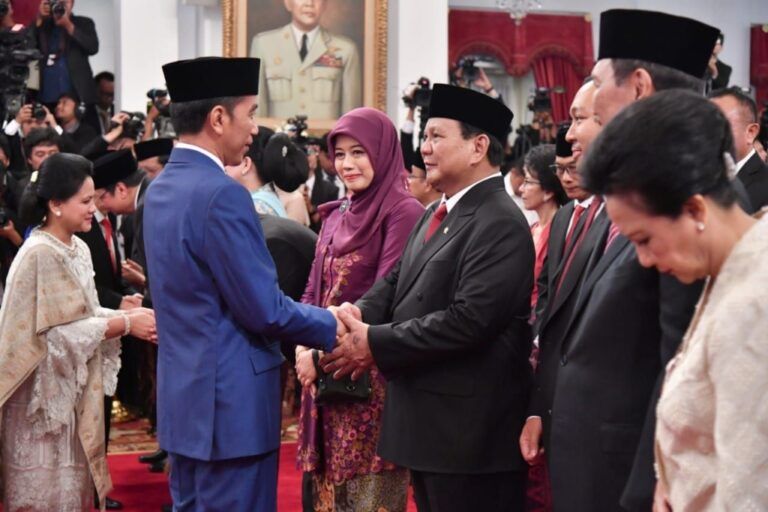Read in: English | Bahasa Indonesia
(San Francisco, April 25, 2024) — President-elect General Prabowo Subianto Djojohadikusumo should divest himself and close family members from ownership and investments in fossil fuels, including coal, oil, and gas, to ensure that when he takes office he avoids conflicts of interest in industries that harm the environment, contribute to increased greenhouse gas emissions, and violate human rights, Climate Rights International said today.
While Prabowo was announced as president-elect in March by the General Elections Commission, the election results were contested by the two other presidential candidates, who alleged irregularities and election fraud, including intimidation of village heads by government authorities to support Prabowo’s campaign and the leveraging of state funds to buy votes. On April 22, the Constitutional Court rejected those allegations as baseless in two decisions responding to petitions by presidential candidates Ganjar Pranowo and Anies Rasyid Baswedan, upholding Prabowo’s election.
“The financial interests of President-elect Prabowo Subianto’s in fossil fuel companies raise serious questions about his commitment to cutting greenhouse gas emissions in Indonesia,” said Brad Adams, executive director at Climate Rights International. “He should divest to ensure that his personal interests do not influence Indonesia’s efforts to combat the climate crisis and uphold the rights of Indonesians.”
Prabowo’s business interests in coal, palm oil, oil and gas, and paper pulp companies have been reported in Indonesian and international media, including by Al Jazeera, Project Multatuli, and Reuters. According to research by the Indonesian civil society organization Mining Advocacy Network (JATAM), Prabowo is the sole shareholder in PT Nusantara Energy, a large company engaged in coal mining, oil palm, and forestry in East Kalimantan on the island of Borneo. JATAM has also documented Prabowo’s financial interests in at least four other coal companies – PT Nusantara Kaltim Coal, PT Nusantara Energindo Coal, PT Erabara Persada Nusantara, and PT Nusantara Wahau Coal – as well as additional forestry, plantation, and paper companies.
Climate Rights International also called on Prabowo’s vice presidential running mate, Gibran Rakabuming Raka, to urge his close family members to divest from any fossil fuel companies in which they may be invested. Gibran is the son of Indonesia’s current president, Joko Widodo, and was controversially found eligible for election by the Constitutional Court, despite being under the 40-year age requirement.
Activists and civil society monitoring groups have also expressed concern about the increased potential for attacks on and criminalization of human rights defenders, journalists, and activists under a Prabowo presidency. During his tenure as commander of the special forces, Prabowo was involved in forced disappearances, kidnapping, and torture of students and NGO activists in 1997, leading to his discharge from the military and a subsequent ban on entry into the United States.
While most of the world is reducing its use of coal to combat the worst consequences of the climate crisis, Indonesia’s coal consumption grew a whopping 33 percent in 2022 from the previous year, and the country continues to be the world’s largest coal exporter.
The continued build-out of coal in Indonesia, including at large nickel industrial parks, is disastrous for the climate and comes at a time when global leaders and experts are calling for an end to all new coal development. Indonesia has made commitments to reduce its reliance on coal, including a September 2022 presidential decree to eliminate coal generation by 2050. Yet this commitment appears to exclude captive coal plants, which directly power industrial operations. Climate Rights International called on Indonesia to speed up the elimination of all coal and for wealthy countries to assist this through benchmarked contributions through the Just Energy Transition Partnership.
Indonesia is the world’s largest producer of nickel, a critical mineral used in electric vehicle batteries and other renewables. In a January report, Climate Rights International documented how Indonesia’s nickel mining and processing industry is driving human rights and environmental abuses and contributing to the climate crisis. In additional to causing severe environmental pollution and impacts on Indigenous Peoples, some community members reported that their land was grabbed by nickel companies, while others told CRI that they were intimidated into selling their land by police or military personnel.
Across Indonesia, the state has failed to fully recognize Indigenous Peoples and their customary lands, and has instead claimed these areas as state-owned assets, leading to land conflicts between Indigenous communities and companies, including nickel mining companies. Indigenous rights groups are pushing for the Indonesian government to pass the Indigenous Peoples’ Rights Bill, which Parliament has failed to enact into law for years, in order to simplify the process of recognition of Indigenous Peoples and their customary lands.
“As the incoming leader of the world’s third largest democracy, Prabowo should prioritize upholding human rights, environmental protection, and climate action,” said Adams. “When he takes office in October, Prabowo should immediately stop the permitting of new fossil fuel projects, including captive coal plants, enact the Indigenous Peoples’ Rights Bill, and commit to upholding and strengthening human rights and environmental laws in Indonesia.”
Photo credit: Inauguration of Prabowo Subianto as Minister of Defence, 2019. Photo via Wikimedia Commons. PDM 1.0 Deed.







